INTERNATIONAL FOURTH EDITION
Digital
Communication
Modern
Analog
Systems
and
B.P. Lathi . Zhi Ding
�
MODERN DIGITAL
AND ANALOG
COMMUNICATION
International Fourth Edition
SYSTEMS
B. P. Lathi
Professor
California
Emeritus
State University-Sacramento
Zhi Ding
Professor
University
of California-Davis
New York Oxford
OXFORD UNIVERSITY PRESS
2010
�
Oxford University Press, Inc., publishes works that further Oxford University's
objective of excellence in research, scholarship, and education.
Oxford New York
Auckland Cape Town Dares Salaam Hong Kong Karachi
Kuala Lumpur Madrid Melbourne Mexico City Nairobi
New Delhi Shanghai Taipei Toronto
With offices in
Argentina Austria Brazil Chile Czech Republic France Greece
Guatemala Hungary
Italy Japan Poland Portugal Singapore
South Korea Switzerland Thailand Turkey Ukraine Vietnam
Copyright© 1983 by CBS College Publishing; © 1989 by B. P. Lathi & Saunders College
Publishing, a division of Holt, Rinehart, and Winston, Inc.;© 1995, 1998, 2010 by B. P. Lathi
Published by Oxford University Press, Inc.
198 Madison Avenue, New York, New York 10016
http:/ /www.oup.com
Oxford is a registered trademark of Oxford University Press
All rights reserved. No part of this publication may be reproduced,
stored in a retrieval system, or transmitted, in any form or by any means,
electronic, mechanical, photocopying, recording, or otherwise,
without the prior permission of Oxford University Press.
Library of Congress Cataloging-in-Publication
Lathi, B. P. (Bhagwandas Pannalal)
Modern digital and analog communication systems/ B. P. Lathi, Zhi Ding.-4th ed.
Data
p. cm.
ISBN 978-0-19-538493-2 (hardcover: alk. paper)
1. Telecommunication systems. 2. Digital communications.
3. Statistical communication theory.
TK5101.L333 2008
621.382-dc22
I. Ding, Zhi, 1962- II. Title.
2008029440
Printing number: 9 8 7 6 5 4 3 2 1
Printed in the United States of America
on acid-free paper
�
BRIEF TABLE OF CONTENTS
Preface xvii
Introduction
1
2 Signals and Signal Space 20
3 Analysis and Transmission of Signals 62
4 Amplitude Modulations and Demodulations 140
5 Angle Modulation and Demodulation 202
6 Sampling and Analog-to-Digital Conversion 251
7 Principles of Digital Data Transmission 326
8 Fundamentals of Probability Theory 393
9 Random Processes and Spectral Analysis 456
10 Performance Analysis of Digital
Communication Systems 506
11 Spread Spectrum Communications 614
12 Digital Communications Under Linearly
Distortive Channels 666
Introduction to Information Theory 734
13
14 Error Correcting Codes 802
A Orthogonality of Some Signal Sets 873
B Cauchy-Schwarz Inequality 875
C Gram-Schmidt Orthogonalization of a
Vector Set 877
D Basic Matrix Properties and Operations 880
E Miscellaneous 885
Index 889
V
�
�
CONTENTS
1
xvii
PREFACE
INTRODUCTION
1 .1
COMMUNICATION SYSTEMS
1.2
1.3
1 .4
1.5
1 .6
ANALOG AND DIGITAL MESSAGES 4
1.2.1 Noise Immunity of Digital Signals 4
1 .2.2
1.2.3
1.2.4
Viability of Distortionless Regenerative Repeaters 5
Analog-to-Digital (A/DJ Conversion 6
Pulse-Coded Modulation-A Digital Representation 7
CHANNEL EFFECT, SIGNAL-TO-NOISE RATIO, AND CAPACITY 9
1 .3 .1
1 .3 .2
Signal Bandwidth and Power 9
Channel Capacity and Data Rate 10
MODULATION AND DETECTION 1 1
1.4.1
1 .4.2
Ease of Radiation/Transmission 11
Simultaneous Transmission of Multiple
Signals-Multiplexing 12
Demodulation 13
1 .4.3
DIGITAL SOURCE CODING AND ERROR
CORRECTION CODING 13
A BRIEF HISTORICAL REVIEW OF MODERN
TELECOMMUNICATIONS 15
vii
�
VIII
SIGNALS AND SIGNAL SPACE
20
CONTENTS 2
2.1
2.2
SIZE OF A SIGNAL 20
CLASSIFICATION OF SIGNALS 22
2.2.1
2.2.2
2.2.3
2.2.4
2.2.5
Continuous Time and Discrete Time Signals 23
Analog and Digital Signals 23
Periodic and Aperiodic Signals 24
Energy and Power Signals 25
Deterministic and Random Signals 25
UNIT IMPULSE SIGNAL 26
SIGNALS VERSUS VECTORS 28
2.4.1
2.4.2
2.4.3 Complex Signal Space and Orthogonality 32
Energy of the Sum of Orthogonal Signals 34
2.4.4
Component of a Vector along Another Vector 28
Decomposition of a Signal and Signal Components 30
CORRELATION OF SIGNALS 34
2.5.1
2.5.2
Correlation Functions 35
Autocorrelation Function 36
ORTHOGONAL SIGNAL SET 36
2.6.1
Orthogonal Vector Space 36
2.6.2 Orthogonal Signal Space 38
2.6.3
Parseval's Theorem 39
THE EXPONENTIAL FOURIER SERIES 39
MATLAB EXERCISES 46
2.3
2.4
2.5
2.6
2.7
2.8
3
ANALYSIS AND TRANSMISSION
OF SIGNALS
62
3.1
3.2
3.3
APERIODIC SIGNAL REPRESENTATION BY FOURIER INTEGRAL 62
TRANSFORMS OF SOME USEFUL FUNCTIONS 69
SOME PROPERTIES OF THE FOURIER TRANSFORM 75
3.3.1
3.3.2
3.3.3
3 .3.4
3.3.5
3.3.6
3 .3 .7
Time-Frequency Duality 76
Duality Property 77
Time-Scaling Property 79
Time-Shifting Property 81
Frequency-Shifting Property 83
Convolution Theorem 87
Time Differentiation and Time Integration 88
3.4
SIGNAL TRANSMISSION THROUGH A LINEAR SYSTEM 90
3.4.1
3.4.2
Signal Distortion during Transmission 92
Distortionless Transmission 92
3.5
IDEAL VERSUS PRACTICAL FILTERS 95
�
Contents
1x
3 .6
3.7
3.8
SIGNAL DISTORTION OVER A COMMUNICATION
CHANNEL 97
3.6.1
3.6.2
3 .6.3
3 .6.4
Linear Distortion 97
Distortion Caused by Channel Nonlinearities 99
Distortion Caused by Multipath Effects 101
Fading Channels 103
SIGNAL ENERGY AND ENERGY SPECTRAL DENSITY 103
3.7.1
3 .7.2
3.7.3
3.7.4
3.7.5
Parseval's Theorem 103
Energy Spectral Density (ESD) 104
Essential Bandwidth of a Signal 105
Energy of Modulated Signals 108
Time Autocorrelation Function and the Energy
Spectral Density 1 09
SIGNAL POWER AND POWER SPECTRAL DENSITY 111
3.8.1
3.8.2
3.8.3
3.8.4
Power Spectral Density (PSD) 111
Time Autocorrelation Function of Power Signals 113
Input and Output Power Spectral Densities 117
PSD of Modulated Signals 118
3.9
NUMERICAL COMPUTATION OF FOURIER TRANSFORM:
THE DFT 118
3.10 MATLAB EXERCISES 123
4
5
AMPLITUDE MODULATIONS
AND DEMODULATIONS
140
4.1
BASEBAND VERSUS CARRIER COMMUNICATIONS 140
4.2
4.3
4.4
4.5
4.6
4.7
4.8
4.9
DOUBLE-SIDEBAND AMPLITUDE MODULATION 142
AMPLITUDE MODULATION (AM) 151
BANDWIDTH-EFFICIENT AMPLITUDE MODULATIONS 158
AMPLITUDE MODULATIONS: VESTIGIAL SIDEBAND (VSB) 167
LOCAL CARRIER SYNCHRONIZATION 170
FREQUENCY DIVISION MULTIPLEXING (FDM) 172
PHASE-LOCKED LOOP AND SOME APPLICATIONS 173
MATLAB EXERCISES 181
ANGLE MODULATION
AND DEMODULATION
NONLINEAR MODULATION 202
5.1
202
5.2
BANDWIDTH OF ANGLE-MODULATED WAVES 209
�
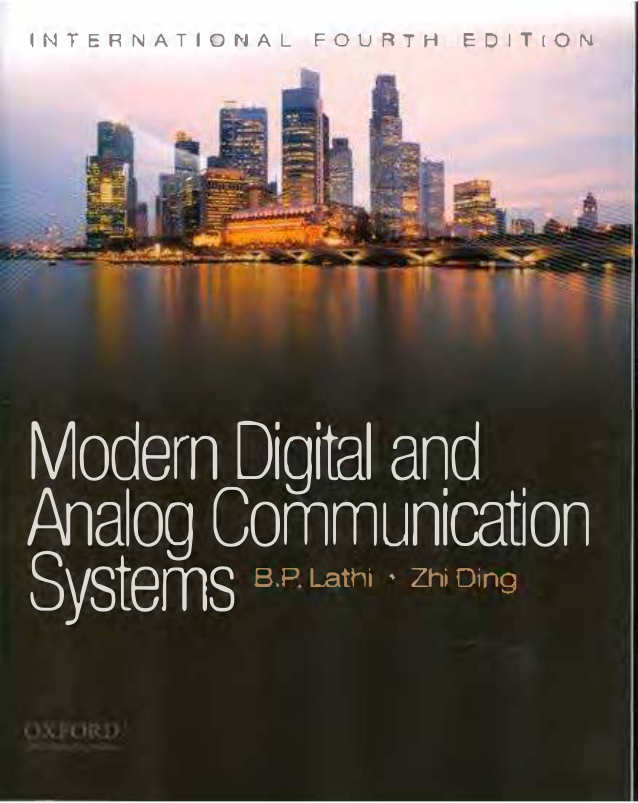
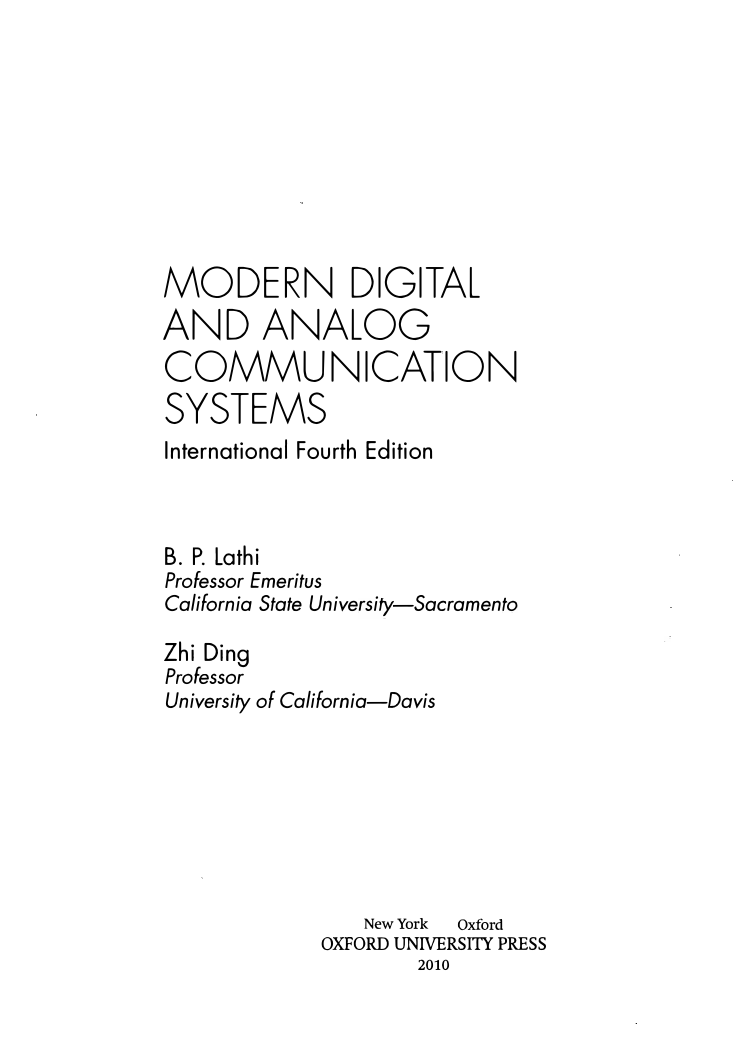
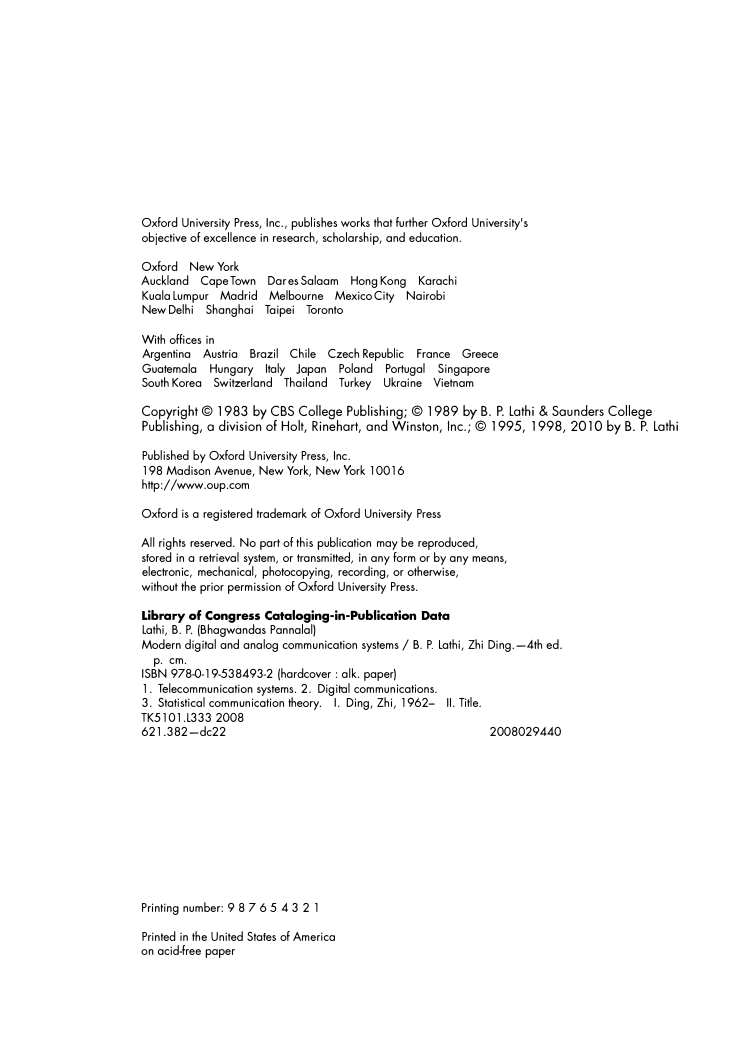
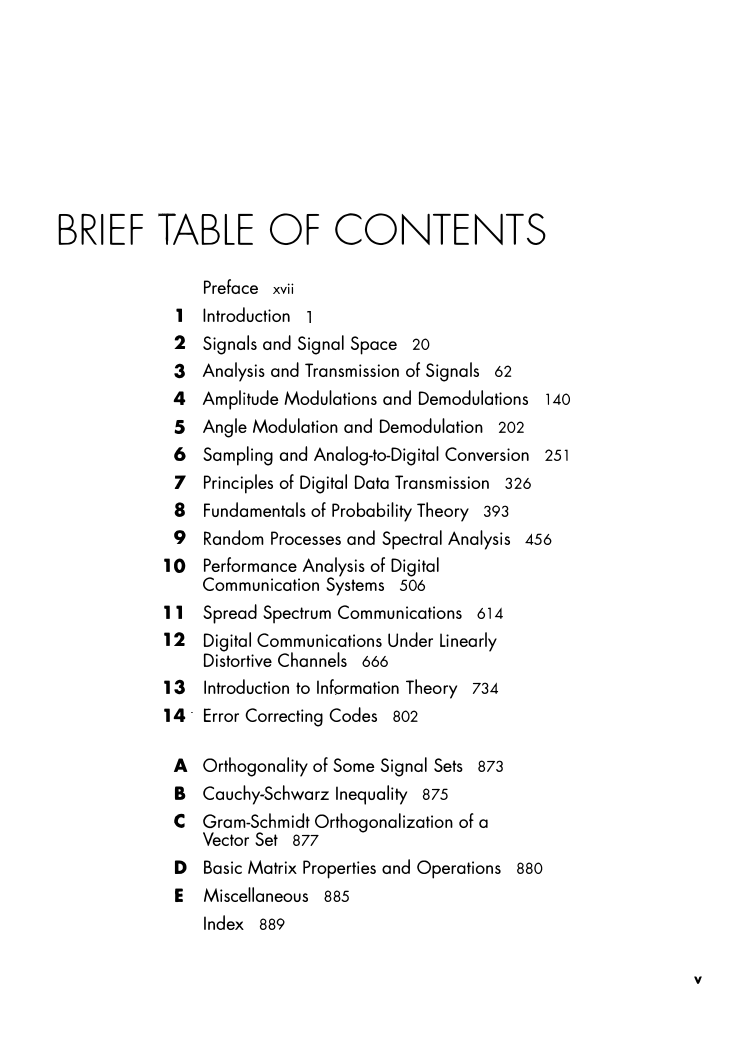
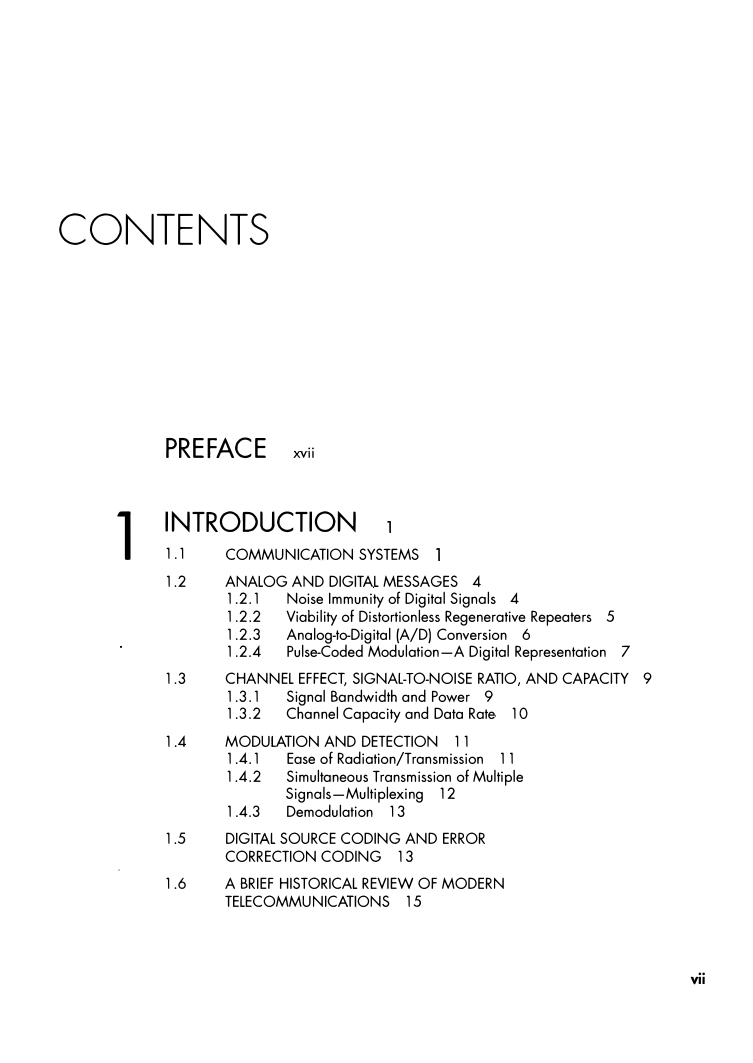
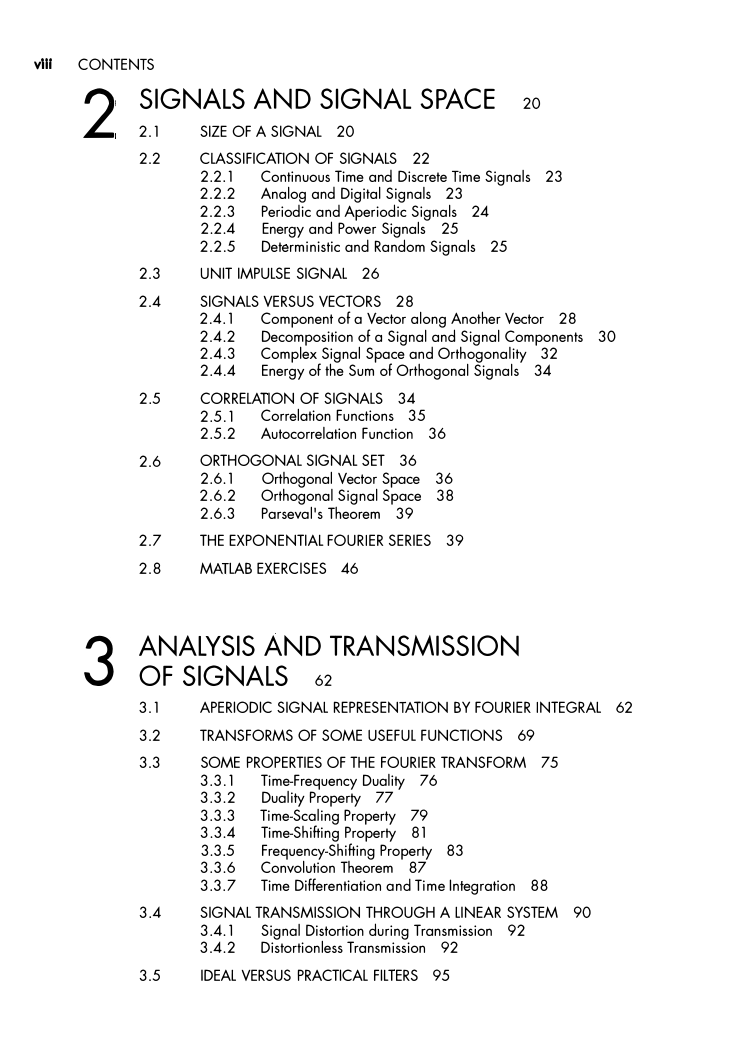
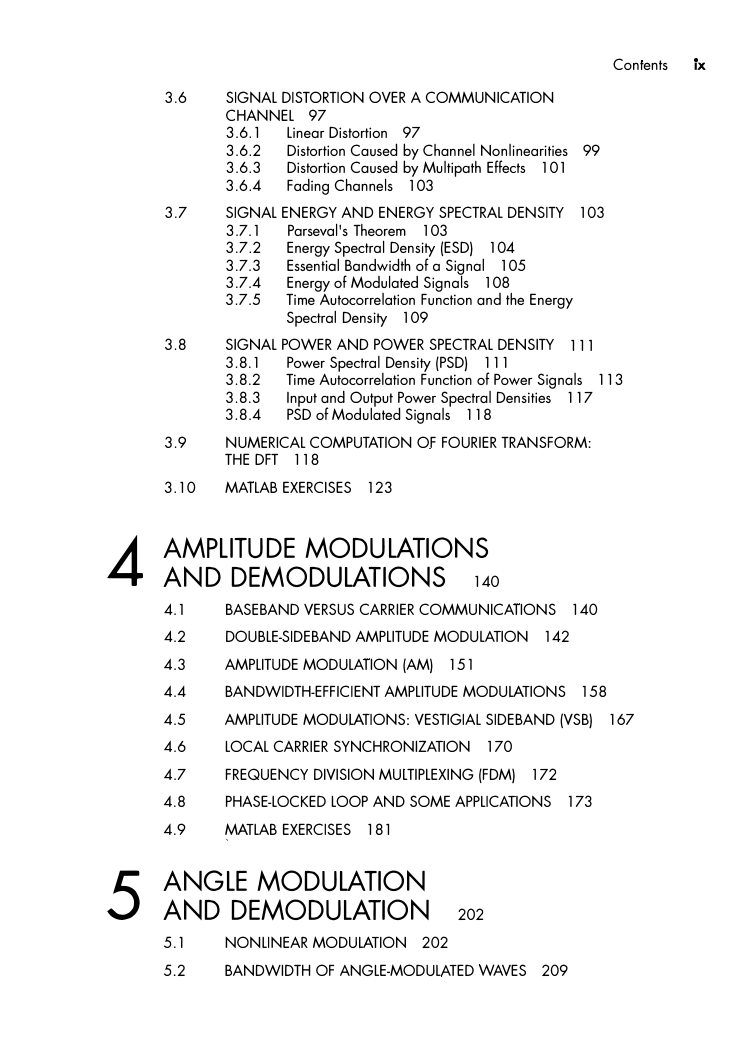








 2023年江西萍乡中考道德与法治真题及答案.doc
2023年江西萍乡中考道德与法治真题及答案.doc 2012年重庆南川中考生物真题及答案.doc
2012年重庆南川中考生物真题及答案.doc 2013年江西师范大学地理学综合及文艺理论基础考研真题.doc
2013年江西师范大学地理学综合及文艺理论基础考研真题.doc 2020年四川甘孜小升初语文真题及答案I卷.doc
2020年四川甘孜小升初语文真题及答案I卷.doc 2020年注册岩土工程师专业基础考试真题及答案.doc
2020年注册岩土工程师专业基础考试真题及答案.doc 2023-2024学年福建省厦门市九年级上学期数学月考试题及答案.doc
2023-2024学年福建省厦门市九年级上学期数学月考试题及答案.doc 2021-2022学年辽宁省沈阳市大东区九年级上学期语文期末试题及答案.doc
2021-2022学年辽宁省沈阳市大东区九年级上学期语文期末试题及答案.doc 2022-2023学年北京东城区初三第一学期物理期末试卷及答案.doc
2022-2023学年北京东城区初三第一学期物理期末试卷及答案.doc 2018上半年江西教师资格初中地理学科知识与教学能力真题及答案.doc
2018上半年江西教师资格初中地理学科知识与教学能力真题及答案.doc 2012年河北国家公务员申论考试真题及答案-省级.doc
2012年河北国家公务员申论考试真题及答案-省级.doc 2020-2021学年江苏省扬州市江都区邵樊片九年级上学期数学第一次质量检测试题及答案.doc
2020-2021学年江苏省扬州市江都区邵樊片九年级上学期数学第一次质量检测试题及答案.doc 2022下半年黑龙江教师资格证中学综合素质真题及答案.doc
2022下半年黑龙江教师资格证中学综合素质真题及答案.doc